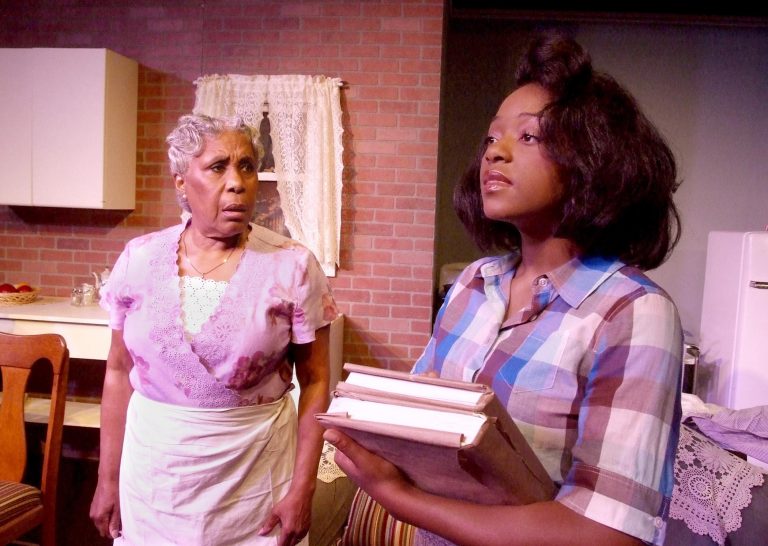In her famous essay “How it feels to be colored me”, American author Zora Neale Hurston declares: “I am not tragically colored”. This quote was extremely impactful when I first read it, around the same time I was reading Lorraine Hansberry’s play A Raisin in the Sun. The excerpt got me thinking specifically about Beneatha Younger. Like Hurston, Beneatha does not see herself as a victim of her race or gender. Instead, she actively challenges societal norms and confidently asserts her identity in ways that make her one of the most compelling characters in Hansberry’s work. Through her defiance, ambition, and self-exploration, Beneatha embodies the struggles and triumphs of female self-expression, navigating the limitations imposed by both her time and those around her. Her journey also reflects broader themes of aspiration and resistance that resonate beyond the play itself.
From the very beginning, A Raisin in the Sun presents a spectrum of different female experiences through its three central women: Lena Younger (Mama), Ruth Younger, and Beneatha. Mama represents the strong, traditional matriarch who leads the family with faith and endurance after the death of her husband. Ruth, as Walter’s wife, embodies a quiet resilience, burdened by the weight of domestic responsibility, an unplanned pregnancy and economic difficulties. Then there is Beneatha: the ambitious and outspoken daughter who seeks more than marriage and being a housewife — she dreams of becoming a doctor. Each of these women carries a different aspect of female existence and identity. Beneatha’s character, however, stands out to me because she dares to say no. She refuses to conform to any prescribed role. She refuses to be boxed in.
One of the scenes that struck me the most occurs when Beneatha speaks about becoming a doctor and also decides to take up guitar lessons. Her mother, confused by Beneatha’s seemingly scattered interests, asks, “Why you got to flit so from one thing to another, baby?”.
BENEATHA —People have to express themselves one way or another.
MAMA What is it you want to express?
BENEATHA (Angrily) Me! (MAMA and RUTH look at each other and burst into raucous laughter) Don’t worry—I don’t expect you to understand.
This is a pivotal moment in the play and one that I couldn’t stop thinking about. It captures Beneatha’s deep yearning for self-expression in a world that constantly tries to limit her — which is so very inspiring. Her ambitions are not confined to one path; she refuses to be reduced to a single expectation. Her refusal to settle or conform makes her character both radical and inspiring.
Another impactful — and heartbreaking — moment occurs when Beneatha openly rejects the idea of God. This is a shocking act, particularly in a Black household where faith is often intertwined with resilience and survival. Beneatha, however, is unafraid to voice her beliefs, proclaiming to her mother:
Mama, you don’t understand. It’s all a matter of ideas, and God is just one idea I don’t accept. It’s not important. I am not going out and be immoral or commit crimes because I don’t believe in God. I don’t even think about it. It’s just that I get tired of Him getting credit for all the things the human race achieves through its own stubborn effort. There simply is not blasted God—there is only man and it is he who makes miracles!
This moment is significant because it highlights not only Beneatha’s intellectual independence but also the depth of her defiance. She is a Black woman in the 1950s, aspiring to be a doctor, in a world that constantly tells her she should not do so. Even in her own home, her ambitions are questioned. Yet, Beneatha does not waver. She challenges these obstacles — whether they come in the form of tradition, gender norms, or religious beliefs — and insists on defining her own path. What could be more powerful than that? God?
Beneatha’s aspirations starkly contrast with the perspectives of the male characters around her, particularly her brother Walter. Walter’s focus is primarily on financial stability; he sees success through the lens of money and power, dismissing Beneatha’s dreams as impractical. As the critic Gursimran Kaur observes, his condescending attitude toward her ambition reflects a broader male chauvinism that attempts to constrain female freedom:
His callous remarks on Beneatha’s career, becoming a doctor, keep his spirit down and mark male chauvinism. But Beneatha is a character who has made a shift from the unfeminine world to feminine sphere far away from emancipation created by man. Her defiance towards Walter marks a voice raised by an African woman towards all barriers of stereotype. Walter’s confrontation with Beneatha yields Ruth, Walter’s wife, to advise her to “be nice” with him sometimes and not to argue over Walter’s insensitive remarks. This advice of Ruth has completely become unacceptable to Beneatha. (Kaur, 2021).
To conclude, I loved Beneatha’s story for her of courage, resistance, and aim to fight for self-definition. She represents the complexities of female self-expression in a world that often seeks to limit it. Through her defiance of gender roles, rejection of societal expectations, and assertion of intellectual independence, she challenges the very fabric of what it meant to be a Black woman in the 1950s, but at the same time she’s a character whose message is ahead of her time. Her struggles remain relevant today, as women across the world continue to fight for autonomy and the right to define themselves beyond societal expectations. Beneatha’s journey, then, is not just a fictional narrative, but also a powerful reminder of the ongoing struggle for self-identity, freedom, and the right to simply be.
REFERENCES:
HANSBERRY, L. A Raisin in the Sun. New York: Random House, 2002.
KAUR, Gursimran. Entrenching Identity: Beneatha in Hansberry’s A Raisin In The Sun. The Criterion: An International Journal in English. Disponível em: <https://www.the-criterion.com/entrenching-identity-beneatha-in-hansberrys-a-raisin-in-the-sun/>
Publicado por

Marília Torres
Aluna da graduação em Letras - Inglês (Licenciatura) na Universidade Federal do Ceará (UFC). Tem experiência profissional e acadêmica na área de ensino de línguas e atua como professora particular de Inglês e Português para estrangeiros. Seus interesses de pesquisa incluem literatura contemporânea em língua inglesa, tradução e adaptação. Gosta de ler e escrever sobre como textos dialogam entre si e se transformam em novas mídias e contextos.
